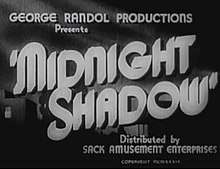Midnight Shadow
Midnight Shadow is a 1939 film with an all African-American cast. It was directed and produced by George Randol, who was also African American.
| Midnight Shadow | |
|---|---|
 | |
| Directed by | George Randol |
| Produced by | George Randol Alfred N. Sack |
| Screenplay by | Arthur Reed |
| Starring | Frances Redd Ollie Ann Robinson Clinton Rosemond Laurence Criner |
| Music by | Johnny Lange Lew Porter |
| Cinematography | Arthur Reed |
| Edited by | Robert Jahns |
Production company | George Randol Productions |
| Distributed by | Sack Amusement Enterprises |
Release date | 1939 |
Running time | 54 min |
| Country | United States |
| Language | English |
Plot
The mind-reading Prince Alihabad courts a girl from Oklahoma played by Frances E. Redd. Her parents want to make her happy, but they do not like that Alihabad worships Allah. A killer is on the loose and locals fear that it might be Alihabad.
Cast
- Frances Redd as Margaret Wilson
- Buck Woods as Lightfoot
- Richard Bates as Jr. Lingley
- Clinton Rosemond as Mr. Dan Wilson
- Jesse Lee Brooks as Sergeant Ramsey
- Edward Brandon as Buster Barnett
- Ollie Ann Robinson as Mrs. Emma Wilson
- Laurence Criner (billed as John Criner) as Prince Alihabad
- Pete Webster (actor) as John Mason
- Ruby Dandridge as Mrs. Lingley
- Napoleon Simpson as Mr. Ernest Lingley
Book coverage
The film was briefly discussed in terms of plot and as an African-American production in the books Hollywood Be Thy Name: African American Religion in American Film, 1929-1949[1] and Whispered Consolations: Law and Narrative in African American Life.[2]
gollark: You can't get them *literally free* until someone invents nanofabricators and an infinite supply of raw materials, or something.
gollark: You mean "paid for by someone else".
gollark: I don't get any push notifications except for direct text messages (and actually not even those now), it's great!
gollark: You can just ignore those.
gollark: You could theoretically do that with different structures to ~~companies~~ companies etc. in a market economy.
References
- Weisenfeld, Judith (January 8, 2007). Hollywood Be Thy Name: African American Religion in American Film, 1929-1949. University of California Press. Retrieved November 26, 2011.
- Christian Suggs, Jon (February 15, 2000). Whispered Consolations: Law and Narrative in African American Life. University of Michigan Press. Retrieved November 26, 2011.
External links
- Full Cast and Crew: Midnight Shadow (1939), IMdB
- Midnight Shadow at AllMovie
- Midnight Shadow at the TCM Movie Database
- Midnight Shadow at the American Film Institute Catalog
- "Ruth Lankford Redd Accompanies the Negro Community Chorus of Columbia, Missouri", undated photograph from Columbia, MO includes John Roland Redd's sisters Ruth Lankford Redd (accompanist) and Frances Elizabeth Redd, Collection: African Americans in Northeast Missouri, Hannibal Free Library
This article is issued from Wikipedia. The text is licensed under Creative Commons - Attribution - Sharealike. Additional terms may apply for the media files.